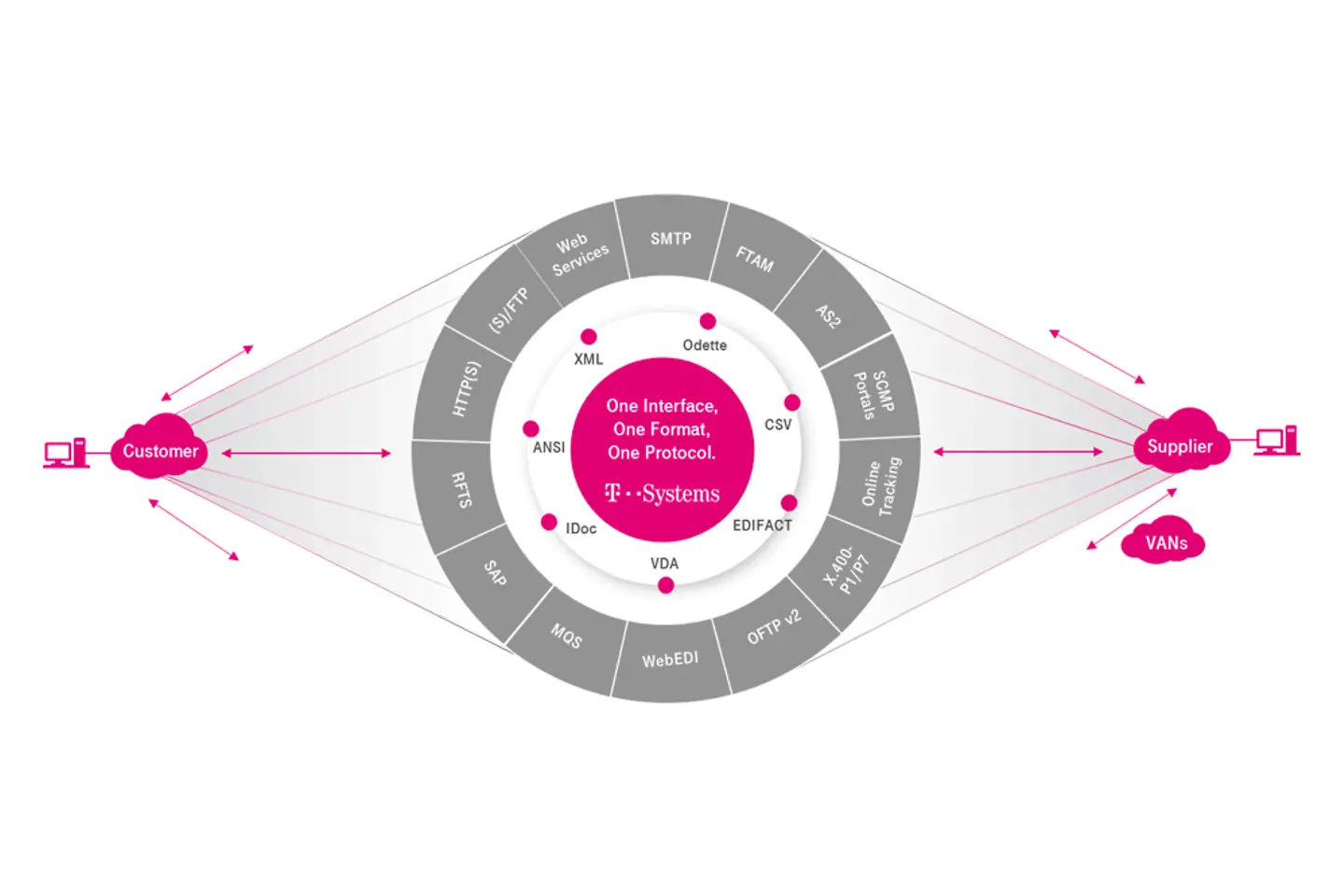
Do you need to optimize processes and avoid bottlenecks as well as interchange, use, and secure data in real time? Electronic data interchange (EDI) is ideally suited to support this – if only the implementation, integration, and management of a B2B platform weren't so laborious. In addition to specialist knowledge, it requires investment in hardware and software. And continuous adjustments swallow up unnecessary time and money. The alternative: managed EDI services from T-Systems.
Speeding up internal and external processes, improving planning quality, and creating genuine information transparency
Managed service means no in-house hardware and software investment, reduction in warehouse stocks, performance and use-based invoicing, and cost and innovation advantages thanks to standardized processes and common interfaces for all B2B and B2C channels
A single interface, all formats, all protocols
High performance and availability of up to 99.98 percent and 24/7 EDI support
Highly secure data center under the strict and proven security and data privacy standards of Deutsche Telekom. The EDI service is exclusively managed by T-Systems employees.

The cost drivers for setting up and operating an in-house EDI solution are software licenses, dedicated hardware, maintenance, and personnel. T-Systems has connected the ERP system of a textile retailer to more than 500 suppliers. Managed EDI services allowed the costs for EDI to be reduced by 50 percent, since there was only one electronic transfer point for communication with all partners. The existing heterogeneity of the networks and protocols were reduced to nil. The retailer was also able to reduce the order and delivery times using automatic warehouse stock reports.
The interaction between part-system or subsystem delivery and production is complex. If around 20,000 suppliers are sharing their business process data globally for the production of vehicles and are conceivably processing over 1.3 million transactions each day, disruptions or outages are absolutely business-critical. To be on the safe side, one automotive manufacturer opted for our managed services for EDI in an all-round care-free operation: high level of availability of 99.98 percent, high system stability and load sharing across two redundant data center locations. German security standards from T-Systems also protect against unauthorized access.

Many companies are meanwhile opting for electronic data interchange (EDI) and have set up their own platform for this. But the majority of EDI standards, EDI documents, EDI processes, and heterogeneous system landscapes, as well as constant updates and the need to encrypt the transferred data, make EDI systems complex. New data formats and communication protocols need to be constantly integrated. Otherwise, errors in data detection occur. This stops automated processes and requires manual rework. A managed EDI solution prevents errors by providing a data hub in the cloud via which data is interchanged in the desired formats and directly processed in the in-house customer system.
Companies require various systems, software, and skills for the many different communication protocols. The complexity of these EDI systems has grown over the years, which makes the outlay for operation and maintenance more expensive as well as considerably increasing the security requirements. Our managed EDI services significantly simplify the automated data transfer and shorten the time it takes to connect new business partners to the system. The offer also supports all international and sector-specific data formats and communication protocols. In most cases this means: parametrization instead of programming.

Electronic data interchange ensures that business-critical data is always processed promptly (just in time and in the right order) and securely, and is only received by trusted business partners. The managed EDI services from T-Systems enable the seamless interchange of customers' electronic data with all their business partners for the replication of supply chain processes in SAP and non-SAP systems. The managed EDI services support all standard communication protocols, including AS2, ALE, and OFTP and all standard formats such as EDIFACT, VDA, X.12, and IDoc.